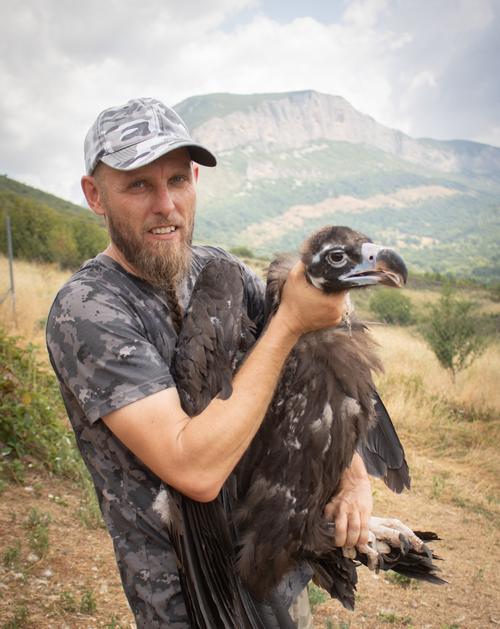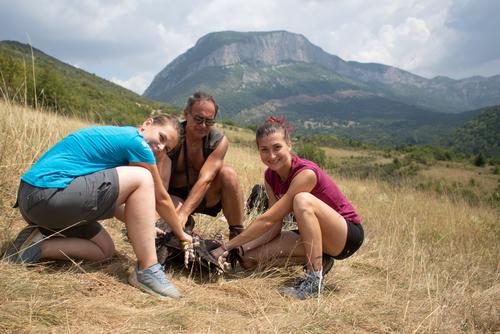++ Two female Cinereous Vultures have been released into the wild in Bulgaria ++ Seven-year project has been completed successfully ++ 3rd September is “World Vulture Day” ++

Hristo Peshev from our Bulgarian partner organisation FWFF with one of the reintroduced female vultures in his arms.
© FWFF
Before cinereous vultures are released into the wild, they are fitted with GPS transmitters. The vulture conservationists want to find out more about the flight routes taken and the sources of danger to this species.
© FWFFRadolfzell, Kotel, Vrachanski Balkans. At the end there were only two of them left in their aviary in the Vrachanski Nature Park in the western part of the Balkan Mountains in Bulgaria. Finally, however, these last two female cinereous vultures were released into the wild. This represented the culmination of the EU-financed LIFE-Project for the release into the wild of black vultures whose Bulgarian population had died out over sixty years ago.
Since 2018 around 70 young black vultures have been released in various regions of the Balkan Mountains. “After all the reintroductions of recent years, the release of these last two female vultures was still something special,” said Hristo Peshev from our Bulgarian partner organisation FWFF and one of the biologists involved in the project. “It will be exciting to see how the vultures acclimatise to their new environment. I am confident that they will be successful, like the majority of the other vultures released into the wild,” Hristo Peshev added.
Despite isolated setbacks, such as poisoning of released vultures, the reintroduction project has been very successful. This year and last year, several pairs of the reintroduced cinereous vultures have already raised offspring - earlier than the experts expected. The foundation for a permanent return of the giant birds of prey has been laid.
Background information:
- The project: The return of the cinereous vulture to its traditional range in the Balkan Mountains was the aim of the seven-year EU-funded LIFE-Project which finished in July 2022. The organisations involved included EuroNatur as well as the two Bulgarian conservation organisations Green Balkans and the Fund for Wild Flora and Fauna, the Spanish regional government of Extremadura and the vulture experts of the Vulture Conservation Foundation. EuroNatur was able to make a valuable contribution to the project with its expertise in the natural regional development in the Balkans. As well as the planned reintroduction of the cinereous and griffon vultures in the region, the project has several other aims, namely, to ensure that the vultures have a secure food supply in the long term, to prevent the laying of poison bait and to reduce to a minimum death from dangerous overhead power lines. Even though the international LIFE-Project has now completed, EuroNatur and its local partners will be taking measures to protect the vultures in the long term. The feeding stations for these carrion eaters will be maintained and cooperation with the farmers of the region continued.
- The vultures: Cinereous vultures (Aegypius monachus) are amongst the giants of the European bird world. With a length of a good metre or more, and a wingspan of up to 2.85 metres, the cinereous vultures and the bearded vulture are Europe’s largest birds of prey – and some of the rarest. In Europe there are only about 1000 pairs of this majestic bird, most of them in Spain. The reintroduction in the Bulgarian Balkan Mountains aims to support the southeastern European population of the cinereous vulture.
- International Vulture Awareness Day: This Day is celebrated each year on the first Sunday in September. The aim for the participating organisations is to present the public with their projects for the protection of the vultures, and thus promote awareness of these carrion eaters. Throughout the world vultures play an important role in ecosystems. Many populations of these birds of prey are under pressure and some species are threatened with extinction.
Enquiries:: Christian Stielow, Mail: christian.stielow(at)euronatur.org, Tel.: +49 (0)7732 – 92 72 15
Select on which of your areas of interest you would like to receive our press releases.
You can subscribe to our RSS feeds to receive all the news on the topics of your choice.


